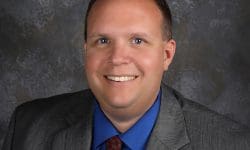How an Urban University Police Department Changed Its Culture
Congratulations to VCU Police Chief John Venuti, who is one of Campus Safety magazine’s Higher Ed Director of the Year award winners. He has transformed not only his department, but how his agency is perceived by the campus and surrounding community.

John Venuti is VCU's Police Department Chief of Police and Assistant Vice President of Public Safety.
Officers Train to Address Use-of-Force Issues
Another challenge facing college campuses across the nation is determining when officers should and should not use force. Venuti recognized this issue early on and has implemented technology, training and strategies to overcome it. Officers now have body-worn cameras. They will also be receiving Fair and Impartial Policing training, where they will learn about implicit bias.
RELATED: Send Us Your Director of the Year Award Nominations
“Research is now showing that every human has biases, so this training is designed to help us recognize our own biases so that it will impact the way we police in a more fair and impartial manner,” Venuti says.
His department also reviews cases where officers have used physical intervention.
“We’ve begun looking at all of our use-of-force incidents, not from the perspective of, ‘Was it justified?’ because there’s an important question that needs to be asked before that,” he says. “The question is, ‘Was the force necessary?’ and if it was necessary, was it justified? We’ve made tremendous progress with that, and I know that on a daily basis, my officers are intentionally deescalating incidents rather than escalating them.
“I never want my officers to be afraid of using force and endanger their lives, but we went from a process when I got here where the incidents were poorly investigated and documented,” Venuti says. “Now, when we use force, we have a comprehensive process in which we document the incident: evidence, photos and witness statements. Then we do an analysis to determine if the force is necessary and justifi
ed.”
The results of all of these efforts are impressive. Over the past five years, VCUPD reduced its officer-involved use-of-force incidents by 81 percent from 75 to 14 incidents. Additionally, complaints about officers and staff have decreased by 40 percent.
“I want to be extremely responsive to everyone’s needs, not just VCU, our students and our faculty,” he adds. “When you do that, I think it enhances your relationships.”
Fast Facts
- VCU PD’s officer-involved use-of-force incidents have declined by 81% in the past five years.
- Complaints about officers and staff have decreased by 40% since 2010
- 96.5% of VCU students, faculty and staff who were surveyed say they feel “safe” or “very safe” on campus
- There have been 775 instances where VCU’s video surveillance system substantially assisted an investigation or captured evidentiary footage since the system was upgraded at the start of the 2013-2014 academic year.
Numbers Don’t Lie
Another way Venuti and his officers affect cultural change on campus and in the department is via a perception of safety survey that they conduct twice a year. Additionally, the survey acts as an educational tool, informing survey takers about various public safety services on campus.
The results have been truly impressive. Of the 1,726 students, faculty and staff who participated in the survey this spring, more than 96 percent said they feel “safe” or “very safe” on VCU’s campus.
The survey also helps VCUPD identify locations on campus where respondents have safety concerns. Then the department does an assessment or custom deployment to address the issues. The survey also allows respondents to ask questions. When a question is asked, someone from the department promptly calls the person back.
Venuti believes that quickly addressing the safety and security concerns mentioned on the survey has helped to improve his department’s credibility with students, faculty, administrators, staff, visitors and the surrounding community.
“Think about the value of the person who reported the bushes being too tall behind a building they walk through in the evening,” Venuti says. “Think about how their perception changes when they walk by that same building a couple of weeks later and that tree has been removed. When you have a responsive and proactive approach, that’s how you change perception.”
Because of all of Venuti and his department’s hard work, VCUPD looks and acts very differently than it did five years ago when the chief started with the university.
“He came to a university police department at VCU that was reeling from a scandal involving the former chief of police, had significant morale issues and enjoyed an uneven reputation with students, faculty, staff and community members,” says VCU Associate Vice Provost Dr. Charles Klink. “The chief did not see these issues as insurmountable obstacles but challenges to be tackled. His positive restlessness has created widespread change within the department leading to a total shift in the community’s experience with, and perception of, the department. Through his leadership, he has brought back respect and a greater appreciation of the department.”
Note: The other higher ed Director of the Year winner is Biola University Chief John Ojeisekhoba. He will be featured in the November/December issue of Campus Safety Magazine.
If you appreciated this article and want to receive more valuable industry content like this, click here to sign up for our FREE digital newsletters!
 Leading in Turbulent Times: Effective Campus Public Safety Leadership for the 21st Century
Leading in Turbulent Times: Effective Campus Public Safety Leadership for the 21st Century
This new webcast will discuss how campus public safety leaders can effectively incorporate Clery Act, Title IX, customer service, “helicopter” parents, emergency notification, town-gown relationships, brand management, Greek Life, student recruitment, faculty, and more into their roles and develop the necessary skills to successfully lead their departments. Register today to attend this free webcast!
















